Military
Baltic region. New challenges, old adversaries.
20 Jun 2011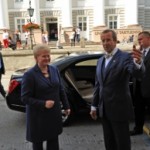 How to prevent future threats to the Baltic region was the main topic at the Estonian – Lithuanian summit, held in Tartu. The two states seek to become NATO’s energy and cyber security hubs not forgetting a recent period of tension with Russia.
How to prevent future threats to the Baltic region was the main topic at the Estonian – Lithuanian summit, held in Tartu. The two states seek to become NATO’s energy and cyber security hubs not forgetting a recent period of tension with Russia.
Estonian President Toomas Hendrik Ilves assured the support of his country in developing the energy security centre in Lithuania into a NATO Centre of Excellence, as the alliance’s cyber defence centre in Tallinn. His Lithuanian colleague Dalia Grybauskaite highlighted that both countries are united by the common goal of preventing the use of energy as a political tool. It is therefore necessary to speed up the integration of the Baltic States’ electricity market into the Nordic market (NordPool), to diversify energy supplies and to reduce dependence on a single supplier.
Mrs. Grybauskaite said that his country supported the construction of a LNG terminal in Estonia or in Latvia, but it had decided to build its own terminal in Klaipeda. She pointed out that several terminals operating in the Baltic countries would increase competition in the gas market, ensure lower consumer prices and strengthen the region’s energy independence.
“Estonia is still interested in participation in the Visaginas nuclear power station,” President Ilves assured, adding that Eesti Energia is currently considering the offers of two potential investors. “Let us hope that the negotiations for finding and involving a strategic investor will be successful and the new nuclear power station will be a project that will really enhance the energy security and independence of the region considerably.”
Speaking about cyber security, Mrs. Grybauskaite proposed to follow the recommendations of the former foreign minister of Norway, Jens Stoltenberg, and to form a Nordic-Baltic cyber defence force.
For a further European integration Mr. Ilves said that “When can we take a high-speed train from Estonia, through Latvia and Lithuania, to Berlin? When will we finally have a modern Via Baltica, which connects all of us and then runs further, to Poland? When will the Baltic states no longer be an energy isle, separated from the rest of Europe? The answers to these questions will also represent our evaluation of the health of our regional co-operation in the 21st century.”
Presidents Ilves and Grybauskaite discussed the neighbourhood policies of the European Union, with an emphasis on Ukraine, Georgia, Moldova and Belarus.
“The government in Minsk, which talks to its people in the language of batons and imprisonment, is not fit to be a part of today’s Europe. In this case, the European Union should use powerful words to provide balance, by uniting its voice with its mind; the pressure on the Belarusian regime needs to be powerful and efficient, with all sanctions very accurately aimed,” President Ilves added.
Travel to the Baltic Hansa, book by Giuseppe D’Amato.
Serbia, Mladic in exchange for EU membership?
26 May 2011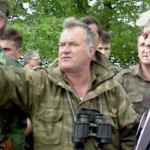
From EuroNews
The arrest of Ratko Mladic is certainly a major step towards a faster integration of Serbia within the EU. His detention has also closed a bloody chapter in the former Yugoslav history, bringing the region closer to reconciliation.
The full co-operation with the International Criminal Tribunal for the former Yugoslavia (ICTY) is the main pre-condition for the negotiations with Brussels. The EU signed a so-called Stabilisation and Association Agreement (SAA) – including an interim deal aiming to facilitate economic and trade relations – with Serbia in April 2008, but then decided to freeze it under Dutch pressure. Only in December 2009 the Netherlands put aside objections related to Belgrade’s performance on war crimes probes.
General Mladic led the militia of the breakaway Republica Srbska, which sought to impose a Serbian identity on the multi-ethnic state of Bosnia; he was the architect of ethnic-cleansing schemes that included the Siege of Sarajevo and the 1995 Srebrenica Massacre in which about 8,000 Bosnian Muslim men were systematically executed. He was indicted by the UN war crimes tribunal in The Hague in 1995 for genocide and other crimes.
The hunt for Mladic started already at the end of 1995. Many observers in Serbia and in the EU suspect that the general has been protected for years by Serbian security forces loyal to President Slobodan Milosevic, who was ousted from power in October 2000. Mladic’s former political master Radovan Karadzic was arrested in 2008 and is still in The Hague.
By the end of the year, after so long negotiations, Serbia will have the chance of formally becoming an EU membership candidate and getting a starting date for accession talks. Serbian President Tadic rejected criticism that Belgrade had only taken action following international pressure and had not calculated when to arrest Mladic, who is considered a hero by local nationalists. But there are still too many unanswered questions.
The European integration of Serbia, Bosnia, and Kosovo is the promise in exchange for concessions to old enemies and the achievement of a complete stable peace in the region. The problem is, however, to understand whether the 27 are ready to accept new members, who have such big open questions in their recent history.
Giuseppe D’Amato
Appena avuta la certezza che l’arabo ucciso ad Abbottabad era Osama Bin Laden il presidente Obama ha subito telefonato a Mosca prima di darne notizia in un discorso televisivo al Paese. L’11 settembre 2001 era stato Vladimir Putin, il primo leader straniero, a contattare George Bush, rinchiuso sull’Air One in volo per motivi di sicurezza. Il favore è stato ricambiato adesso, nove anni e sette mesi dopo.
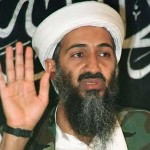
Osama Bin Laden
Le due superpotenze del Ventesimo secolo sono stati infatti i Paesi maggiormente colpiti dal terrorismo internazionale. Il Cremlino aveva avvertito per tempo la Casa bianca negli anni Novanta che la jihad islamica, armata precedentemente in funzione anti-sovietica, era sfuggita di mano ai finanziatori occidentali. Fu così l’ex Kgb a dare a Washington le coordinate di dove si trovassero i campi di addestramento dei terroristi in Afghanistan nell’estate del 1998, pochi giorni dopo che Al Qaida aveva fatto esplodere in un attentato le ambasciate Usa in Africa orientale. Gli Stati Uniti si fidavano, però, allora molto di più degli alleati regionali, i pakistani, che degli ex avversari della Guerra Fredda.
I russi in realtà non hanno mai distolto la loro attenzione dall’Afghanistan anche dopo il ritiro del febbraio 1989. Quando il 27 settembre 1996 i talebani presero Kabul Mosca organizzò una riunione d’emergenza delle repubbliche ex sovietiche asiatiche in cui avvertì gli ex fratelli del pericolo. Seguirono ripetute campagne armate degli islamisti nel cuore del continente, mentre Bin Laden continuava l’invio di suoi uomini in Cecenia, visitata in precedenza dal “numero due” di Al Qaida l’egiziano al Zawahiri.
Oggi la strategia di Barack Obama è di ritirare rapidamente le truppe Usa dai vari teatri di guerra per risparmiare preziosi dollari necessari a ripianare l’immenso debito statale ereditato dall’Amministrazione Bush. Solo così l’America potrà rispondere in un futuro prossimo alla sfida cinese e della globalizzazione in generale. Che siano ora gli alleati vecchi e nuovi ad iniziare a cavarsela da soli, si pensa a Washington. Emblematica è l’uscita di scena americana alla chetichella dal conflitto in Libia.
La morte di Bin Laden segna uno spartiacque nella politica internazionale. Il capo dei terroristi è stato liquidato e i suoi seguaci “arabi” nella regione sono in rotta. “Giustizia” per i cittadini americani, morti l’11 settembre, è stata fatta. L’“exit strategy” dall’Afghanistan, resa nota al vertice Nato di Lisbona lo scorso autunno, può pertanto iniziare come previsto nel 2014.
La telefonata di Obama a Dmitrij Medvedev, buttato giù dal letto prima dell’alba, non è solo un giusto ricambio di cortesie ricevute ma anche l’annuncio del prossimo passaggio di consegne. Fra il 2011 ed il 2014 si tenterà di trovare una soluzione politica per l’Afghanistan, poi gli occidentali se ne andranno. La “patata bollente” tornerà così nelle mani del Cremlino. Ma la Russia odierna ha la forza ed il prestigio di tenere sotto controllo un’area così estesa ed esplosiva come l’Asia centrale? A Mosca a dubitarne sono numerosi specialisti che affermano sicuri: senza un Afghanistan pacificato difficilmente ci sarà pace per i Paesi limitrofi. Il rebus su come fare è aperto a tutti.
Giuseppe D’Amato
Putin, a difesa dello status-quo.
21 Apr 2011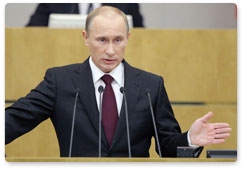 La Russia deve evitare forme di “liberalismo ingiustificato” o esperimenti strani per difendere la sua “sovranità” contro infiltrazioni straniere. Così Vladimir Putin nel suo discorso annuale sul lavoro del governo davanti alla Duma. “Il Paese – ha spiegato il premier – ha necessità di un decennio di stabilità e di tranquillo sviluppo evitando esperimenti e confusione”.
La Russia deve evitare forme di “liberalismo ingiustificato” o esperimenti strani per difendere la sua “sovranità” contro infiltrazioni straniere. Così Vladimir Putin nel suo discorso annuale sul lavoro del governo davanti alla Duma. “Il Paese – ha spiegato il premier – ha necessità di un decennio di stabilità e di tranquillo sviluppo evitando esperimenti e confusione”.
L’obiettivo definito da Putin è di far entrare la Russia nel novero delle prime cinque potenze economiche del mondo per il 2020. Dopo gli anni del boom dovuto ai profitti dalla vendita delle materie prime Mosca ha l’arduo compito di trasformare ed ammodernare la sua economia. Nel 2011 il Pil crescerà del 4% circa.
Il piano di spese per i prossimi anni è davvero imponente. Le iniziative sociali e la costruzione di infrastrutture come aeroporti sono ai primi punti. Per quanto riguarda gli aspetti militari i soldi vanno spesi in Patria. Si assiste così ad un’inversione di tendenza dopo gli accordi con vari Paesi per l’acquisto di tecnologia di nuova generazione. Le trattative con la Francia per le portaelicotteri della classe “mistral” sono ad un punto morto.
Il discorso di Putin alla Duma è certamente la base della campagna elettorale del partito del Cremlino, Russia Unita. In dicembre sono previste le parlamentari, nel marzo 2012 le presidenziali a cui non si sa ancora se il primo ministro parteciperà come candidato o lascerà il passo al leader uscente Medvedev.
Il premier non ha tuttavia chiarito nel suo discorso e nel “question time” se la crisi economica di fine decennio è stata finalmente superata. A parte quello energetico, rinvigorito dall’aumento dei prezzi delle materie prime sui mercati internazionali, numerosi altri settori vivono un momento di attesa. Gli imprenditori aspettano probabilmente che si capisca meglio quale sarà il futuro del Paese dopo questo anno elettorale.
Poland-Libya. Tusk criticizes Europe for its “hypocrisy” and low protection of civilians.
12 Apr 2011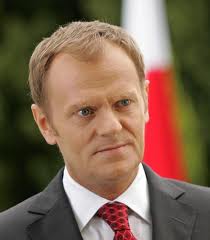 Poland highlights the European “hypocrisy” in Northern Africa. This is one of the main reasons behind Warsaw’s decision not to participate in NATO’s military operations in Libya, Polish Prime Minister Donald Tusk told Gazeta Wyborcza. According to him, Europe risks creating the impression it only intervene when oil supplies are at stake.
Poland highlights the European “hypocrisy” in Northern Africa. This is one of the main reasons behind Warsaw’s decision not to participate in NATO’s military operations in Libya, Polish Prime Minister Donald Tusk told Gazeta Wyborcza. According to him, Europe risks creating the impression it only intervene when oil supplies are at stake.
“Although there exists a need to defend civilians from a regime’s brutality, isn’t the Libyan case yet another example of European hypocrisy in view of the way Europe has behaved towards Gaddafi in recent years or even months?” said Mr. Tusk. He also added: “If we want to defend people against dictators and repression, torture or imprisonment, then this rule must be universal.”
In future Poland, a usually staunch NATO ally that sent soldiers to Iraq and still has 2,600 troops in Afghanistan, “will take decisions on military involvement elsewhere only when” there’s “a 100 percent conviction that it is absolutely necessary,” explained Mr. Tusk.
Warsaw that assumes the European Union’s rotating six-month presidency in July is also a close ally to the United States. President Obama decided to withdraw its military after the first days of the intervention. Poland has no national interests in Libya and faces parliamentary elections in autumn. The current war has shown that the EU does not have a common foreign policy that it is still in the hands of the states. French president Sarkozy and British Prime minister Cameron’s initiative in Africa has provoked divisions in the 27-nation bloc.
Poland is the biggest beneficiary of the regional EU aids. Talks on the EU’s next multi-year budget are set to begin later this year under the Polish presidency. At that time it would be important not to forget other types of “hypocrisy”.
“Russia has revealed details of its ambitious plan to upgrade its army over the next ten years, planning to spend US$ 650 billion.
First and foremost, Russian defense will focus on the development of strategic nuclear weapons, construction of over 100 military vessels for Russian Navy, including construction of four originally French-made Mistral-class amphibious assault ships, and the introduction into the Air Force of over 1,000 helicopters and 600 military planes, including fifth generation PAK-FA fighter.
Most of the military hardware will be equipped with next-generation weaponry.
For the first time ever, Russia is planning to buy military equipment from NATO-member countries – two Mistral helicopter carriers will be bought in France (with two more licensed to be built in Russia), as well as samples of armored vehicles from Italy and elements of personal combat systems also from France.
Moscow’s plans to modernize Russian strategic nuclear forces do not contravene the newly-signed New START nuclear arms reduction treaty with the US, which aims at the reduction of up to a third of the strategic nuclear weapons in both Russia and the US”.
Russia Today – February 25th, 2011.
If the renewal is a success, it will leave Russia less reliant on the nuclear arsenal it inherited from the USSR. “Russia needs a professional non-commissioned officer corps to train specialists who can really put these arms to effective use,” Pavel Felgenhauer, an independent military analyst, told AP. “This spending necessitates a whole new kind of military.”
On the same topic:
Article 1. Associated Press —-Article 2. Ria Novosti July 2010.
SIPRI, Top 100 arms-producing companies – 2009.
21 Feb 2011 For the first time, the turnover of arms manufacturing companies in 2009 exceeded $ 400 billion, an increase of 8% over 2008 and 59% compared to 2002. The figures are contained in the annual report of SIPRI, the Peace Research Institute in Stockholm.
The U.S. holds 61% of turnover, with 8 companies in the top ten. Among the most important companies Lockheed, Boeing and British Bae Systems. The Italian Finmeccanica is eighth in this special standing with 13 billion dollars and 3.3% of the market share.
“This is the 8th year in which Russian companies have been covered by the SIPRI Top 100. There may be other Russian companies that should be in the list but for which insufficient data is available. Figures for Russian companies are from the Centre for Analysis of Strategies and Technologies (CAST), Moscow.
This is the first year in which United Aircraft Corporation (UAC) and United Engine Corporation (UEC)—the two new main Russian state-owned conglomerates—reported parent company figures and subsidiary figures. In previous years, these figures were reported separately for each subsidiary or not reported at all. This year figures for Irkut, MiG and Sukhoi are reported as subsidiaries of UAC. UEC also reported overall arms sales figures. Although reported as a parent company here, Vertolety Rossii is a subsidiary of OPK Oboronprom.”
For more detail on Russian arms-producing industry consolidation, see Jackson, S., ‘Arms production’ SIPRI Yearbook 2010; and Perlo-Freeman, S. et al., ‘The SIPRI Top 100 arms-producing companies, 2007’, SIPRI Yearbook 2009, pp. 286–87.
Report – SIPRI – Stockholm –
Russia – USA. The new START after the “reset”.
24 Dec 2010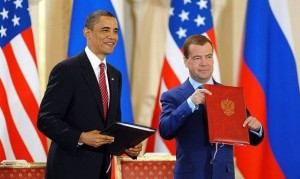 The world is a little bit safer today after the agreement among former foes on the most complex part of the Cold War legacy. The U.S. Senate passed the New START treaty by a vote of 71 to 26 on Wednesday, while the Russian parliament may give its approval to the pact soon. Moscow becomes a real partner to the West and in the next following months will take part in the building up of the regional anti-missile Shield together with the USA and NATO.
The world is a little bit safer today after the agreement among former foes on the most complex part of the Cold War legacy. The U.S. Senate passed the New START treaty by a vote of 71 to 26 on Wednesday, while the Russian parliament may give its approval to the pact soon. Moscow becomes a real partner to the West and in the next following months will take part in the building up of the regional anti-missile Shield together with the USA and NATO.
The New Start treaty, which will replace its lapsed predecessor Start (Strategic Arms Reduction Treaty), was signed by the two Presidents Obama and Medvedev in April 2010. It trims US and Russian nuclear arsenals to 1,550 deployed nuclear warheads – a cut of about 30% from a limit set eight years ago. The treaty would also allow each side visually to inspect the other’s nuclear capability, with the aim of verifying how many warheads each missile carries.
“Within 45 days after entry into force, we will also then be exchanging our first data for the database under the treaty,” Rose Gottemoeller, US assistant secretary for the Bureau of Arms Control, Verification and Compliance, told. “That’s data on the current status and deployment of our strategic nuclear forces – intercontinental ballistic missiles, submarine-launched ballistic missiles, and bombers,” she said. She also added that the first inspections will take place within 60 days after entry into force of the new START.
The cuts in the arsenals were the easiest part of the negotiated agreement. Americans and Russians take equally important technological and economic benefits from this decision. Old and outdated weapons, which maintenance costs too, will be dismissed. Financial savings will be used for research and development of new weapons.
The New START treaty is “a cornerstone of security for the coming decades,” according to President Medvedev. “The treaty brings our relations with the United States to a fundamentally new qualitative level, to the level of equality, parity, and a balance of interests,” Foreign Minister Sergei V. Lavrov told deputies at the Duma, the Russian low chamber of Parliament.
Japan, the only nation ever to have come under nuclear attack, called the ratification of the START an “important progress” in disarmament efforts by Washington and Moscow. Tadatoshi Akiba, the mayor of Hiroshima, which was destroyed by the world’s first atomic bombing in 1945, said “a world without nuclear weapons” had come “a step closer”, as sought by US President Obama. The USA and Russia send a clear signal on their leadership role against nuclear proliferation.
The first major positive consequence of the ratification of the treaty is the birth of a common regional shield to protect the West and Russia against short-and medium isolated missile launches, as decided at the Lisbon summit in November. The former “rogue States” will need years to develop modern intercontinental carriers. This is one of the reasons why President Obama decided not to follow Bush’s military policy with the development of the strategic Shield in Europe.
The second effect is political. The Kremlin is no more isolated as it was from 2006 to 2009. A fully integrated in the West and the most possible democratic Russia is a guarantee of stability for the entire world.
Giuseppe D’Amato
Wikileaks. NATO, the Baltics, and Russia.
7 Dec 2010The main task of all military organizations is to be prepared for hostilities or to create the conditions to get the peace showing their strength. During the Cold War the “balance of terror” guaranteed five decades of stability to the world.
WikiLeaks cables has revealed secret NATO plans to defend Baltics from Moscow. The decision to draft them was taken earlier this year at request of the United States and Germany at the Northern Atlantic Alliance headquarters. The White House also offered to beef up Polish security against Russia by deploying naval and air forces to the region.
In those months Washington and Moscow were toughly negotiating the new START agreement and President Barack Obama was promoting a new approach to the former foes. The 21st century challenges need new solutions and an agreement among the most developed countries is desirable. Negotiations with the Kremlin were successful at last, and Russia was later invited to join a section of the western security system at Lisbon’s summit in November.
It would have been surprising whether the NATO had not prepared plans to protect its allies in Eastern Europe. In the cables it is written that this planning is an “internal process designed to make the Alliance as prepared as possible for future contingencies” and “it is not ‘aimed’ at any other country.” Relationships with Russia began to be strained after Saint Petersburg’s G8 summit in 2006. A cyber-attack on Estonia in 2007 was believed to have originated in Russia, and the war broke out in Georgia a year later. Russia’s foreign ministry said it was “bewildered” by revelations edited by the British newspaper The Guardian, but this kind of reaction is part of the game.
«Конференции Организации по безопасности и сотрудничеству в Европе — события в современном мире все более редкие. Последнее такое мероприятие случилось в Стамбуле аж одиннадцать лет назад.
Пусть в Астану не приехал самый завидный политический “жених” ОБСЕ — президент США Барак Обама. Пусть точно так же поступили высшие лидеры Франции и Англии. Но состав гостей все равно получился вполне внушительный. Ангела Меркель, Сильвио Берлускони, почти все высшие лидеры постсоветских стран — в общей сложности около трех десятков первых лиц различных евразийских стран.
В теории конференция ОБСЕ — вершина общеевропейского политического диалога. На практике это серия монологов, каждый из которых не имеет ничего общего с предыдущим…
Ясно, что на таком “саммите имени Вавилонской башни” никаких конкретно значимых решений не может быть принято в принципе. Но иногда конкретные значимые решения — это еще не все. Сейчас дискуссия о будущем политическом устройстве Евразии фактически монополизирована такими структурами, как НАТО и Евросоюз. Это приводит к весьма неприятным для нас последствиям. Спроси любого западного эксперта о будущей роли Украины и Белоруссии в Европе. Ответ последует незамедлительный: в НАТО могут вступать или не вступать в зависимости от желания. Но в Евросоюзе Минск и Киев будут обязательно!
За год своего председательства в ОБСЕ Казахстан не сделал, да и не мог сделать эту контору по-настоящему сильной организацией. Но по крайней мере встряхнул ОБСЕ, вывел ее из состояния летаргического сна. Ведь до этого в Организации по сотрудничеству и безопасности в Европе по сути мало что делалось».
Статья – Михаил Ростовский – Московский Комсомолец № 25514 от 2 декабря 2010 г. Mikhail Rostovsky Moskovskij Komsomolets
* * *
«Споры по поводу итогового документа форума были столь бурными, что презентовать его публике лидер Казахстана Нурсултан Назарбаев смог лишь далеко за полночь… Все решения на конференциях ОБСЕ принимаются методом консенсуса. Если кто-то из 56 “пассажиров” чем-то недоволен, паровоз не может лететь вперед… Рожденный в муках итоговый документ саммита оказался предельно общим и размытым…. И вот грустный финал. Выяснилось, что нам гораздо легче разговаривать с западниками на саммитах НАТО и ЕС или на двусторонних переговорах. Почему? Наверно, потому, что на подобных рандеву обсуждаются конкретные проекты, в чьих успехах заинтересованы все. А мероприятия ОБСЕ — это пока в основном говорильня об отвлеченных принципах. Поэтому здесь к Москве относятся, руководствуясь принципом “мимо тещиного дома я без шуток не хожу”».
Статья – Московский Комсомолец № 25516 от 4 декабря 2010 г. Михаил Ростовский – Mikhail Rostovsky Moskovskij Komsomolets
Welcome
We are a group of long experienced European journalists and intellectuals interested in international politics and culture. We would like to exchange our opinion on new Europe and Russia.
Categories
- Breaking News (11)
- CIS (129)
- Climate (2)
- Energy&Economy (115)
- EU Eastern Dimension (85)
- Euro 2012 – Sochi 2014 – World Cup 2018, Sport (43)
- Euro-Integration (135)
- History Culture (198)
- International Policy (261)
- Military (74)
- Interviews (18)
- Italy – Italia – Suisse (47)
- Odd Enough (10)
- Poland and Baltic States (126)
- Religion (31)
- Russia (421)
- Survey (4)
- Turning points (4)
- Ukraine (176)
- Российские страницы (113)
Archives
- November 2020
- October 2020
- September 2020
- August 2020
- July 2020
- May 2020
- April 2020
- March 2020
- January 2020
- December 2019
- November 2019
- October 2019
- September 2019
- August 2019
- July 2019
- June 2019
- May 2019
- April 2019
- March 2019
- February 2019
- December 2018
- November 2018
- October 2018
- September 2018
- August 2018
- July 2018
- June 2018
- May 2018
- April 2018
- March 2018
- February 2018
- January 2018
- December 2017
- November 2017
- October 2017
- September 2017
- August 2017
- July 2017
- May 2017
- March 2017
- January 2017
- December 2016
- November 2016
- October 2016
- September 2016
- July 2016
- June 2016
- May 2016
- April 2016
- February 2016
- January 2016
- November 2015
- October 2015
- September 2015
- June 2015
- April 2015
- March 2015
- February 2015
- January 2015
- December 2014
- November 2014
- October 2014
- September 2014
- August 2014
- July 2014
- June 2014
- May 2014
- April 2014
- March 2014
- February 2014
- January 2014
- December 2013
- November 2013
- October 2013
- September 2013
- August 2013
- July 2013
- June 2013
- May 2013
- April 2013
- March 2013
- February 2013
- January 2013
- December 2012
- November 2012
- October 2012
- September 2012
- August 2012
- July 2012
- June 2012
- May 2012
- April 2012
- March 2012
- February 2012
- January 2012
- December 2011
- November 2011
- October 2011
- September 2011
- August 2011
- July 2011
- June 2011
- May 2011
- April 2011
- March 2011
- February 2011
- January 2011
- December 2010
- November 2010
- October 2010
- September 2010
- August 2010
- July 2010
- June 2010
- May 2010
- April 2010
- March 2010
- February 2010
- January 2010
- December 2009
- November 2009
- October 2009
- September 2009
- August 2009
Our books




